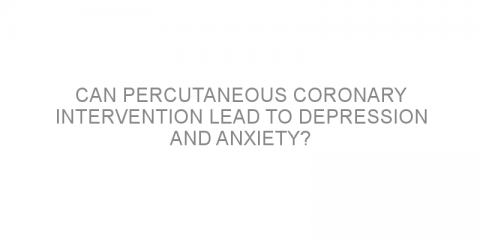In a nutshell The aim of this study was to investigate if a large first dose (loading dose) of atorvastatin (Lipitor) can reduce major adverse cardiovascular events (MACE) in patients with heart attacks and unstable angina. Some background Acute coronary syndrome (ACS) is a term which describes heart attacks and unstable angina A heart attack is a...
Read MoreTreatment(s) now being considered-Percutaneous coronary intervention (PCI) Posts on Medivizor
Looking for patients with coronary artery disease to test a new stent
In a nutshell This trial is examining the effectiveness of a new drug-releasing stent, Svelte, for the treatment of coronary heart disease (CAD). The main outcome to be measured will be target lesion failure (heart attack/death due to blockage in the blood vessel that has the stent) 12 months later. This study is being conducted in the...
Read MoreStents vs. bypass – a 10 year follow-up in patients with coronary heart disease
In a nutshell This study investigated the long-term outcomes of coronary artery bypass grafting (CABG) and percutaneous coronary intervention (PCI) to treat coronary heart disease (CHD). They found that CABG was associated with a longer-term benefit than PCI. Some background Coronary heart disease (CHD) is caused by blockages to the vessels...
Read MoreIs angioplasty as safe as coronary artery bypass grafting in people with left main coronary artery disease?
In a nutshell This study compared the safety of percutaneous coronary intervention (PCI) with drug-eluting stents (DESs) to coronary artery bypass grafting (CABG) in patients with left main coronary artery disease (LMCAD). It determined that PCI and CABG were equally safe, mortality-wise. However, PCI was associated with more non-fatal heart attacks,...
Read MoreComparing treatment methods for non-ST elevation acute coronary syndrome
In a nutshell This study aimed to compare the outcomes of coronary artery bypass grafting and percutaneous coronary intervention with drug eluting stents in patients with non-ST elevation acute coronary syndrome. This study concluded that non-ST elevation acute coronary syndrome patients treated with coronary artery bypass grafting had better...
Read MoreA comparison of treatments for left main coronary artery disease
In a nutshell This study aimed to compare the effectivness of coronary artery bypass grafting surgery and percutaneous coronary intervention with drug eluting stent in patients with left main coronary disease. This study concluded there were no differences in effectiveness at 3–5 years after coronary artery bypass grafting surgery or...
Read MoreCan percutaneous coronary intervention lead to depression and anxiety?
In a nutshell This study aimed to investigate the prevalence of depression and anxiety symptoms in patients with myocardial infarction who are treated with primary percutaneous coronary intervention. This study concluded that these patients had low rates of depression and anxiety symptoms following treatment, but these symptoms may increase after a...
Read MoreWhat are the long term effects of BVS stents?
In a nutshell The aim of this study was to examine the long term effects of BVS. This study concluded that the rate of device-related complications from BVS did not decline over time. Some background Percutaneous coronary intervention (PCI) is a non-surgical process that delivers a small structure called a stent to the coronary arteries...
Read MoreIs PCI beneficial in women with stable heart disease?
In a nutshell This paper studied differences in men and women when they received optimal medical therapy plus a percutaneous coronary intervention (PCI). There were no significant differences in outcome whether patients received PCI or optimal medical therapy alone. Some background Optimal medical therapy refers to achieving good blood...
Read MoreHow long should dual antiplatelet therapy be given after a drug-eluting stent insertion?
In a nutshell This paper studied how long dual antiplatelet therapy should be given for after a drug-eluting stent insertion. The authors concluded that continuing dual antiplatelet therapy beyond 12 months can be carefully considered in selected patients with low bleeding risk. Some background A drug-eluting stent is a mesh wire structure...
Read MoreWhat is the best duration for dual antiplatelet therapy after a PCI?
In a nutshell The authors studied the best duration for dual antiplatelet therapy (DAPT) after a percutaneous coronary intervention. Shorter DAPT duration was associated with higher rates of total heart attacks, lower rates of major bleeding, and similar rates of death. Some background A percutaneous coronary intervention (PCI) is a...
Read More5-Year outcome of a bioresorbable stent
In a nutshell This paper studied the long-term outcomes from the implantation of a bioresorbable scaffold that releases everolimus in patients with coronary stenosis. The 5-year study found that the scaffold was safe for use. Some background Coronary stenosis refers to narrowing of the blood vessels that supply blood to the heart. This is...
Read More













